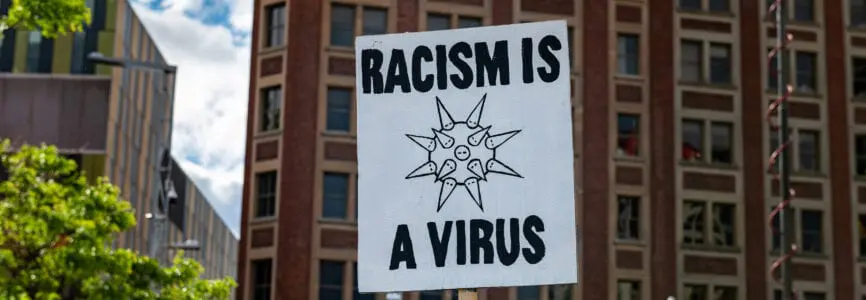Bioethics Forum Essay
Committing to Fight Racism
We have reached a very sad, painful moment in the United States. It feels like a cascade of calamities, one compounding the next. An infectious disease pandemic that we cannot yet cure has precipitated an economic crisis. An episode of police brutality against a black man has added the name George Floyd to a long list of victims of unfair policing practices in black communities.
These events shine a light on how much structural racism continues in our country. The storm of protests against police violence are unfolding at the same time that the coronavirus pandemic is hitting minority communities much harder than other communities, with fewer opportunities to stay home safely and greater chances of dying when struck with the virus. Instead of creating a sense that “we are all in this together,” these layered crises have pointed out all too clearly that some of us are far more vulnerable than others.
The current situation brings us to an uncomfortable realization as two “seasoned” white bioethicists who take injustice seriously: we simply have not been doing enough in our professional capacities to actively denounce or address the persistent problems of structural racism.
We have noticed the responses of our students and younger colleagues in this moment to this cascade of crises. They are holding their academic departments and university leadership accountable. They are graduating early and volunteering as caregivers in their hospitals when the wards are packed with Covid-19 patients. They are helping to distribute personal protective equipment that is in short supply. They are making deliveries for food banks. They are sharing compelling personal narratives. They are participating in demonstrations, and if they are not protesting themselves, they are sheltering those who are. They are organizing reading groups and helping us locate the most effective charities to which to contribute.
We admire our younger colleagues and are grateful that they are so willingly tackling those problems that we have not yet managed to address in more effective ways. We have much to learn from their ability to fearlessly connect the work of understanding injustice and structural racism with taking a stance against it. Their example increases our own resolve to do more. We are in more professionally secure positions in these later stages of our careers than they are, which arguably gives us an even greater responsibility to take a more active stance against racism ourselves.
Last week, as we were just starting to find the words that we wanted to try to express here, another Hastings Bioethics Forum essay tackled the role of bioethicists in denouncing racism head on. The authors interrogate the silence of bioethicists regarding racial injustice, challenging us to “adopt resistance and advocacy as core ethical values, not only in response to large tragedies but as a daily praxis in clinics, research settings, and policy.” We heed this call and invite our fellow bioethics colleagues to join us in candid, uncomfortable conversations about what we can and should be doing differently. We also commit to continuing these efforts after the immediacy of this moment has subsided.
As a starting point, we are listening carefully to a more diverse range of voices in the field of bioethics, as well as in neighboring disciplines such as public health, sociology, and anthropology, and what they can teach us about antiracism work. We are especially grateful for the leadership and guidance of Dr. Giselle Corbie-Smith, director of the UNC Center for Health Equity Research, who urges us (and provides us with specific resources) to:
- Commit to self-study on systems of oppression and how to be an ally.
- Commit to using frameworks, praxes, and theory that center the voice of those at the margins.
- Commit to authentic engagement and collective action for structural change.
Dr. Corbie-Smith further reminds us that we can “leverage our positions of power to consciously decide to make sure that those that have been marginalized by existing systems of oppression are at the center of all that we do and that their perspectives and world view drive our work towards equity.”
Indeed, we can. In a broadcast e-mail message to NIH staff last week, Francis Collins called for us to “recommit ourselves to our shared goals of making the world a better place–for everyone.” Our commitment to the mission of NIH obliges us to ensure that our work addresses structural racism in order to enhance the lives and health of populations who persistently suffer from its impacts. And we acknowledge that doing so will require us to learn new tools and frameworks for expanded kinds of work with our bioethics community. We are making that commitment.
Marion Danis, MD, a Hastings Center board member and fellow, chairs the Hastings Center’s fellows council. She is head of the Section on Ethics and Health Policy in the Department of Bioethics at the Clinical Center of the National Institutes of Health and serves as Chief of the Ethics Consultation Service at the Clinical Center. Sara Chandros Hull, PhD, is director of the Bioethics Core of the National Human Genome Research Institute and a faculty member in the Department of Bioethics, Clinical Center, NIH. Both have previously written about the role of bioethicists in addressing structural racism and health disparities. This work is a reflection of the views of the authors and does not necessarily reflect the official policies of the National Institutes of Health or the U.S. Department of Health and Human Services.













